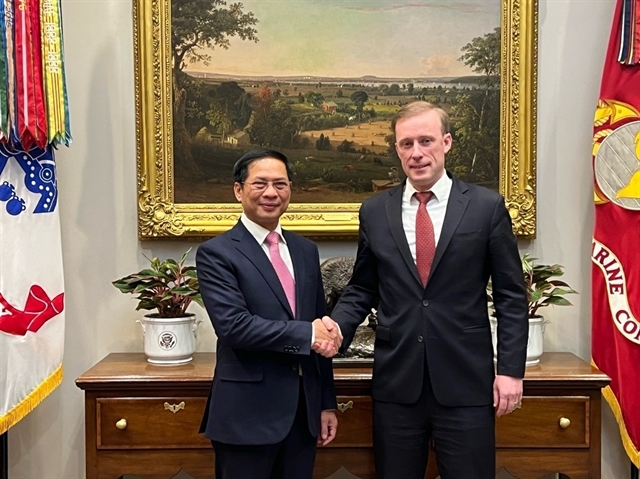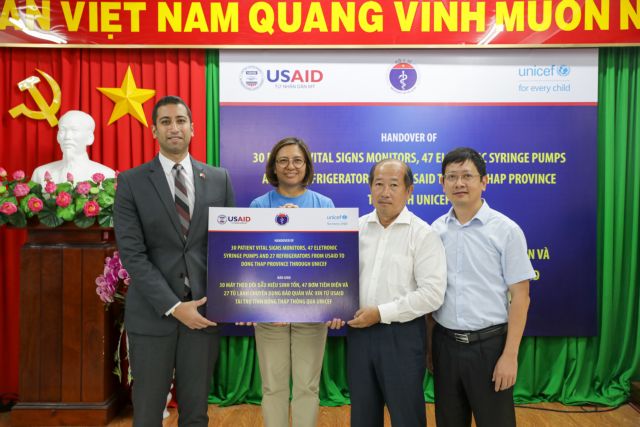 Politics & Law
Politics & Law

 |
| Representatives of USAID, UNICEF and Vietnamese health authorities at the handover ceremony in Đồng Tháp on Friday. — Photo courtesy of UNICEF. |
HÀ NỘI — More than 1,500 items of medical equipment were handed over to Việt Nam's health authorities on Friday as part of the support from the United States and United Nations Children's Fund (UNICEF).
The US Agency for International Development (USAID) and UNICEF have provided 680 patient vital signs monitors, 810 electronic syringe pumps and 150 refrigerators to health departments across nine provinces in the country -- Thái Bình, Sơn La, Nghệ An, Đồng Tháp, Sóc Trăng, Lai Châu, Điện Biên, Gia Lai and Thái Nguyên.
The vital sign monitors and syringe pumps are being distributed to hospitals to increase their ability to effectively monitor and treat patients suffering from infectious diseases.
The vaccine refrigerators, which maintain the required temperature range of 2-8 degrees Celsius for safe vaccine storage, will be distributed to commune health centres to ensure the availability of vaccines from the National Expanded Programme on Immunisation (EPI) for community members.
This equipment will empower healthcare professionals to provide timely and precise care, improving patient treatment.
The symbolic handover ceremony took place in Đồng Tháp Province on Friday, with the attendance of Dr Hany Helmy, Deputy Office Director, USAID/Việt Nam Office of Health; Anjanette Saguisag, Acting Deputy Representative of UNICEF Việt Nam; Dr Dương Đức Thiện, Deputy Director of the Department of Planning and Finance, Ministry of Health; and Dr Đoàn Tấn Bửu, Director of Đồng Tháp Department of Health.
Dr Helmy said: "The US Government is proud to continue our strong collaboration with the government and people of Việt Nam in jointly addressing the national and global challenge of infectious diseases.
"The critical commodities provided by USAID through UNICEF will help Việt Nam to strengthen the country's capacity to effectively monitor and treat patients suffering from infectious diseases, including COVID-19, and to further improve cold chain systems for routine immunisation and COVID-19 vaccination campaigns."
Anjanette Saguisag, UNICEF Việt Nam Acting Deputy Representative, added: "Access to reliable medical equipment is essential for effective healthcare delivery.
"This contribution will significantly improve the capacity of hospitals at both national and sub-national levels to manage and treat infectious diseases, ensuring better health outcomes for children, women and communities across Việt Nam.
"With USAID’s support, UNICEF is pleased to work with the Ministry of Health and help strengthen its immunisation systems, ensuring that families in remote areas have strengthened access to safe vaccines."
Dr Dương Đức Thiện extended appreciation to USAID and UNICEF "for the timely support from the Government and people of the United States, and from UNICEF in the fight against the COVID-19 pandemic."
He said: "USAID and UNICEF are among the countries and organisations that have provided the most support to Việt Nam, including COVID-19 vaccines/vaccination supplies, cold chain equipment for vaccination, treatment equipment, ventilators, vital sign monitors, liquid oxygen systems, and more, for hospitals, helping Việt Nam to control and reduce COVID-19 mortality rates."
The nine locations receiving the equipment have been identified as requiring additional support to cope with healthcare burdens associated with infectious diseases.
This initiative is part of a broader effort by USAID and UNICEF to enhance global health security and strengthen healthcare systems in countries facing public health challenges.
The provided medical equipment and cold chain supplies will provide long-term services, improving the resilience and preparedness of Việt Nam's healthcare system. — VNS




